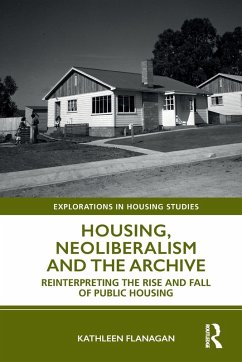From the mid-1940s, state housing authorities in Australia built large housing estates to enable home ownership by working-class families, but the public housing system they created is now regarded as broken. Contemporary problems with the sustainability, effectiveness and reputation of the Australian public housing system are usually attributed to the influence of neoliberalism. Housing, Neoliberalism and the Archive offers a challenge to this established 'rise and fall' narrative of post-war housing policy. Kathleen Flanagan uses Foucauldian 'archaeology' to analyse archival evidence from the Australian state of Tasmania. Through this, she reveals that the difference between past and present knowledge about the value, role and purpose of public housing results from a significant discontinuity in the way we think and act in relation to housing policy. Flanagan describes the complex system of ideas and events that underpinned policy change in Tasmania while telling a story about state housing policy, neoliberalism and history that has resonance for many other places and times. In the process, she shows that the story of public housing is more complicated than the taken-for-granted neoliberal narrative and that this finding has real significance for the dilemmas in public housing policy that face us in the here and now.
Hinweis: Dieser Artikel kann nur an eine deutsche Lieferadresse ausgeliefert werden.
Hinweis: Dieser Artikel kann nur an eine deutsche Lieferadresse ausgeliefert werden.








